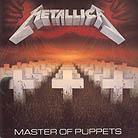October 1999
Musically, the album is phenomenal from start to finish. Although the music is unbelievably fast, it is controlled, well timed, meticulously arranged, and full of the vibrant energy of a hyperactive teenager on PCP. The title track is a masterpiece of songwriting in this genre and displays some of the best metal arrangement to date. "Welcome Home (Sanitarium)" features some of Kirk Hammett’s better guitar work on the album, and its intro is mesmerizing. The over-eight-minute instrumental "Orion" keeps you captivated each and every second with some great bass lines and time changes. "Damaged, Inc," the final cut, ends the album as appropriately as it begins with "Battery," a blitzkrieg of rhythm and searing guitars that will keep your chiropractor busy for weeks repairing the inevitable whiplash. A little confession here. When I heard that DCC was going to remaster Master Of Puppets, I was psyched. This album set a standard for many other metal albums to follow -- and few have come close. In my opinion, Master Of Puppets is the best speed-metal album, period. With these biases, I had high hopes that DCC would do a good job. For 13 years, I have been living with two different recordings, and both have their limitations. The original Elektra CD release was mastered in 1986 and has the usual early-CD problems: compressed, edgy, thin, and sterile sound. The Music of the Nations direct-metal master 45-RPM LP release is much better than the Elektra CD, although LP’s soundstage is a little homogenized and the dynamics are slightly limited. The DCC release addresses these issues with aplomb. The product of vacuum-tube technology, the DCC disc sounds, for lack of a better word, great. The most notable difference is that the fullness and body of the instruments has been restored, while the detail is improved. Burton’s bass often gets lost in the rhythm-guitar work, but the DCC remaster captures it better than the Elektra release. The background is cleaner, the dynamics improved, and the warm sound is definitely easier on the ears. Not only is this a must-have disc for metal fans, I would highly recommend it to anyone wishing to know what the best metal has to offer. This album is a reference point for the genre, and the DCC remaster is the best-sounding release out there. GO BACK TO: |
 Metallica - Master of Puppets
Metallica - Master of Puppets![[Reviewed on Gold CD]](../format/goldcd.gif) There
was a time when speed metal was primarily underground music considered by most to be just
screaming guitars, fast rhythms, and aggressive vocals listened to by young, rebellious
males with long hair and too much testosterone (yes, I admit, I too was one of the
aforementioned). Metallica helped change this impression and brought speed metal above
ground and to the masses. By showing off furious speed, mind-numbing tempo and
time-signature changes, intelligent lyrics, and complex arrangements, Master Of Puppets
was the first Metallica album to gain wide acceptance and popularity. Amazingly, this
was done with virtually no airplay and no MTV. At that stage in Metallica’s career,
they shunned MTV as being commercialized nonsense. Thirteen years later, Master Of
Puppets is now a multi-platinum album and gets more radio airplay than ever.
There
was a time when speed metal was primarily underground music considered by most to be just
screaming guitars, fast rhythms, and aggressive vocals listened to by young, rebellious
males with long hair and too much testosterone (yes, I admit, I too was one of the
aforementioned). Metallica helped change this impression and brought speed metal above
ground and to the masses. By showing off furious speed, mind-numbing tempo and
time-signature changes, intelligent lyrics, and complex arrangements, Master Of Puppets
was the first Metallica album to gain wide acceptance and popularity. Amazingly, this
was done with virtually no airplay and no MTV. At that stage in Metallica’s career,
they shunned MTV as being commercialized nonsense. Thirteen years later, Master Of
Puppets is now a multi-platinum album and gets more radio airplay than ever.